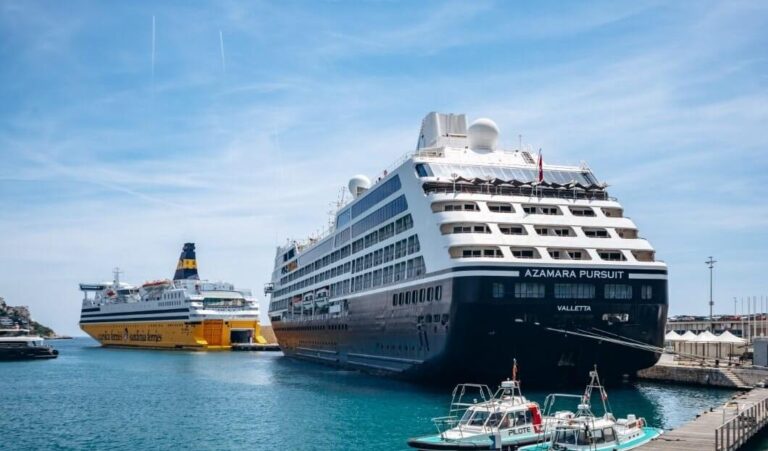Nice and Cannes Look to Ban Large Cruise Ships from 2025: A Push for Sustainable Tourism
In a bold move aimed at preserving their picturesque coastlines and enhancing the quality of life for residents, the French Riviera cities of Nice and Cannes are considering a ban on large cruise ships starting in 2025. As tourism continues to rebound in the post-pandemic era, local authorities are increasingly concerned about the environmental impact and overcrowding associated with these massive vessels. The proposed measures reflect a growing trend among popular tourist destinations to prioritize sustainability and mitigate the often-overlooked repercussions of mass tourism. With many stakeholders weighing in, this developing story highlights the tension between economic interests and ecological responsibility in one of the world’s most iconic locales.
Nice and Cannes Propose Restrictions on Large Cruise Ships Starting in 2025
In a significant move aimed at protecting both the environment and the local communities, the picturesque cities of Nice and Cannes have announced plans to impose restrictions on large cruise ships starting in 2025. This decision comes in response to growing concerns over the ecological impact of massive vessels, which have been linked to pollution and overcrowding in these popular tourist destinations. Local leaders have emphasized the importance of sustainable tourism solutions that balance economic benefits with the preservation of natural beauty and heritage.
The proposed restrictions are expected to include measures such as:
- Size Limitations: Only smaller cruise ships will be permitted to dock, which will help reduce the number of tourists flooding the area at any given time.
- Environmental Standards: Ship operators may be required to meet stringent environmental guidelines to minimize emissions and waste.
- Visitor Cap: A cap on the maximum number of cruise passengers allowed per day will be established to maintain the charm and accessibility of local attractions.
| Key Changes | Impact |
|---|---|
| Implementation Year | 2025 |
| Ship Size Restrictions | Limited to smaller vessels |
| Environmental Compliance | Mandatory adherence to eco-friendly practices |
| Visitor Management | Capped daily cruise passengers |
Environmental Concerns Drive Policy Changes in Iconic French Riviera Destinations
The picturesque allure of the French Riviera has long been entwined with its bustling ports, where the grandeur of cruise ships often overshadows the delicate ecosystems of the region. In a significant policy shift, officials in both Nice and Cannes have announced a plan to prohibit large cruise liners from docking in their cities starting in 2025. This decision comes as a response to increasing concerns regarding the environmental impact of such vessels, which contribute to air pollution, marine degradation, and overtourism that threatens local communities and habitats.
Among the upcoming measures, authorities are focused on several key environmental initiatives:
- Air Quality Improvement: Reducing emissions from cruise ships that significantly affect the region’s air quality.
- Marine Ecosystem Protection: Safeguarding local marine life and habitats from the disturbances caused by large vessels.
- Tourism Sustainability: Promoting smaller, eco-friendly alternatives that align with the Riviera’s commitment to preserving its natural beauty.
| Concern | Impact |
|---|---|
| Air Pollution | Increased respiratory issues in local populations. |
| Water Quality | Degradation of marine ecosystems, affecting biodiversity. |
| Overtourism | Strain on local infrastructure and quality of life for residents. |
This bold move aims to reshape the tourism landscape in one of the world’s most cherished travel destinations, setting a precedent for other coastal cities grappling with similar challenges. With the return of tourists post-pandemic, the emphasis is now on balancing economic benefits with long-term ecological stewardship, securing the Riviera’s future for generations to come.
Local Economy Impact: Balancing Tourism and Sustainable Practices
The decision by Nice and Cannes to ban large cruise ships starting in 2025 reflects a growing concern over the impact of mass tourism on local economies and environments. Coastal cities have long grappled with the balance between the influx of tourists and the sustainability of their natural resources. While cruise tourism brings significant financial benefits, such as increased spending in local businesses and job creation, it can also lead to detrimental effects on marine ecosystems and overcrowding in picturesque areas. Key factors to consider include:
- Environmental degradation: Damage to marine life and coastal habitats.
- Community strain: Overcrowding can detract from local residents’ quality of life.
- Economic fluctuations: Dependence on cruise tourism can make local economies vulnerable to global travel trends.
Emergency measures, such as this ban, aim to cultivate a more sustainable approach to tourism by encouraging different forms of travel that emphasize cultural exchange and environmental stewardship. Both cities are exploring alternatives to attract tourists without compromising their natural charm. Considerations for future tourism strategies might include:
| Alternative Approaches | Description |
|---|---|
| Eco-Tourism Initiatives | Activities focused on conservation and sustainability. |
| Cultural Exchanges | Programs that foster local heritage and art appreciation. |
| Smaller Group Tours | Intimate experiences that promote lower visitor numbers. |
This proactive stance signifies a comprehensive approach to safeguarding local interests while ensuring that tourism contributes positively to the region’s economy and culture. By prioritizing sustainability, Nice and Cannes set the stage for a resilient future that honors both their locales and their guests.
Recommendations for Stakeholders in the Cruise Industry and Tourism Sector
As Nice and Cannes take decisive steps to restrict the docking of large cruise ships starting in 2025, stakeholders within the cruise industry and tourism sector must pivot their strategies to adapt to these changes. To mitigate potential economic impacts while ensuring sustainability, it is essential for ports and local businesses to collaborate closely. Key recommendations include:
- Engage in Open Dialogue: Encourage discussions among local authorities, environmental groups, and cruise companies to create a balanced approach that accommodates tourism while protecting marine ecosystems.
- Promote Sustainable Tourism Alternatives: Shift focus toward eco-friendly travel options, such as small ship cruises or land-based tourism experiences that highlight local culture and heritage.
- Invest in Infrastructure Improvements: Enhance port facilities to accommodate smaller vessels that can still provide passengers with memorable experiences without compromising environmental integrity.
Furthermore, industry stakeholders should prioritize the development of comprehensive marketing strategies to attract visitors beyond cruise ship arrivals. This includes emphasizing the unique attractions of both cities and their commitment to preserving environmental health. A collaborative framework could encompass:
| Strategy | Description |
|---|---|
| Local Partnerships | Build alliances with local businesses to offer bundled packages that promote regional attractions. |
| Awareness Campaigns | Run initiatives that educate potential travelers about the positive impacts of sustainable tourism. |
| Feedback Mechanisms | Implement systems to gather feedback from tourists to continuously improve offerings and meet expectations. |
Insights and Conclusions
In conclusion, the decision by Nice and Cannes to potentially ban large cruise ships starting in 2025 marks a significant shift in the approach to tourism and environmental sustainability in the French Riviera. With growing concerns over the ecological impact of mass tourism and local quality of life, officials are prioritizing the preservation of these iconic destinations. As discussions continue, stakeholders in the cruise industry and local economies will need to adapt their strategies to align with these evolving regulations. The future of cruise tourism in this picturesque region hangs in the balance, signaling a pivotal moment in balancing economic interests with environmental stewardship. As communities weigh their options, the eyes of the world will be watching to see how this initiative unfolds and shapes the future of travel in the C√īte d’Azur.




